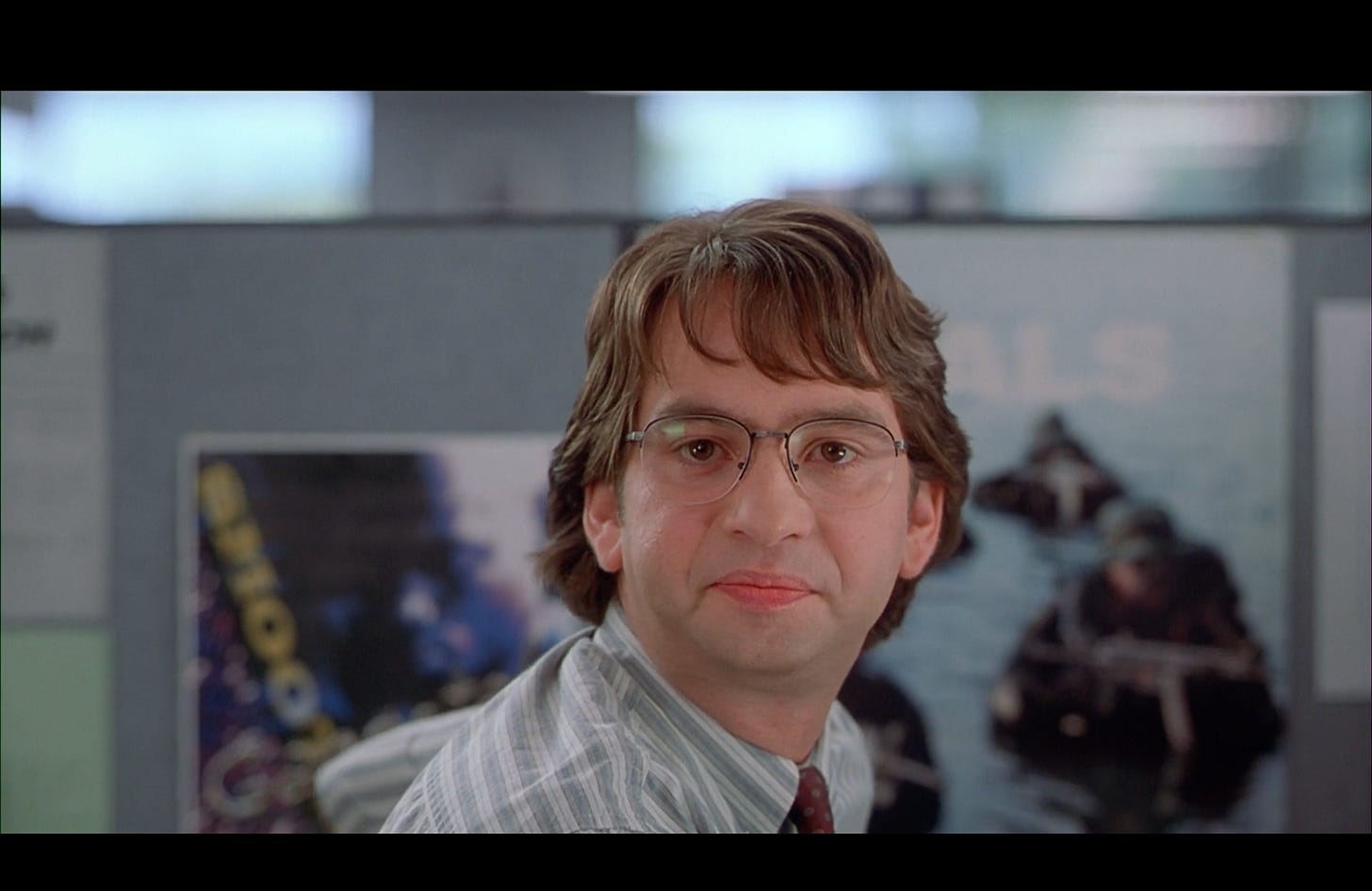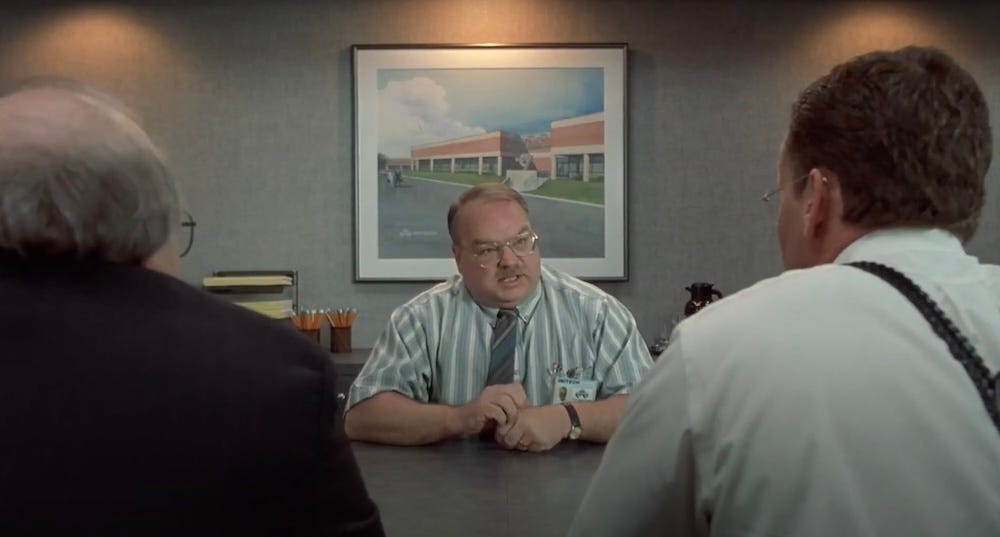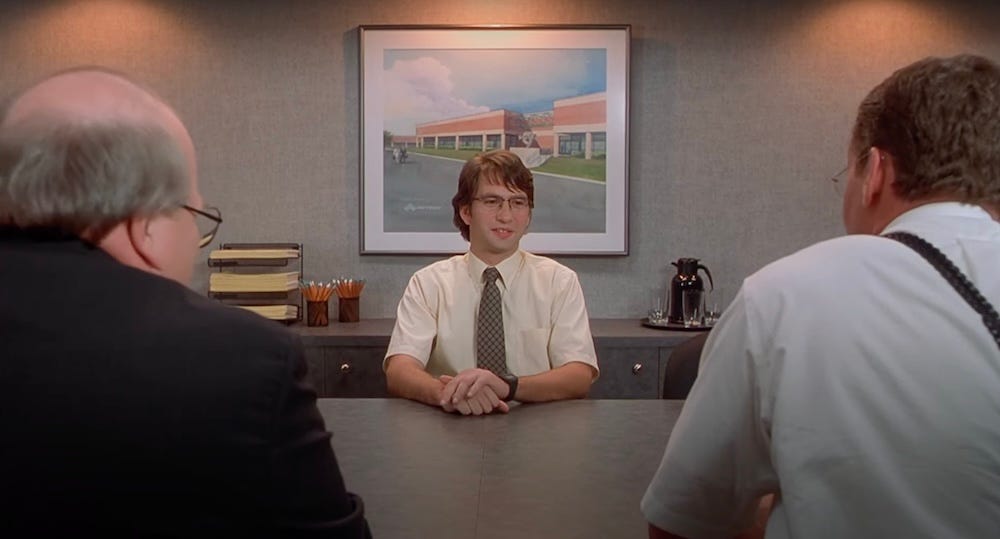The Class of 1999: 'Office Space'
The first of 1999's many films raging against cubicle life.
1999 was a historically-great year for film and dramatic narrative as a whole. I’m using my 2024 to look back at, reconsider, and celebrate these stories as they all celebrate their 25th anniversaries. I recently re-reviewed The Blair Witch Project; next up on the docket is The Matrix. But first… it’s time for…
Office Space - written and directed by Mike Judge - February 19, 1999
One of the more noticeable recurring themes of films released in 1999 is the existential malaise of white collar workers. Films across the board dealt with class in some way or another - but, specifically, The Matrix, Fight Club, American Beauty, and Being John Malkovich all suggested that careers in cubicles were at the center of turn-of-the-century human misery. Which kinda makes sense, when you think about it: these sorts of jobs didn’t really exist before the twentieth century, and they’re certainly not attractive to creative people… like, say, the people who make movies.
The trend actually kicked off with Mike Judge’s workplace comedy, Office Space. In fact, Office Space includes a suspenseful scene in which the protagonist tries to avoid someone from finding him in his cubicle - a concept also used in The Matrix, which was released just six weeks later.
Office Space was Judge’s live-action feature writing and directing debut after creating Beavis and Butt-Head and King of the Hill. The film was extrapolated from a series of animated shorts he made for Saturday Night Live:
I saw Office Space opening night with a packed house that literally gave it a standing ovation when it was over. But that was an anomaly. The movie received reviews that were middling at best (Stephen Holden at The New York Times: “moderately savvy”) and cruel at worst (Entertainment Weekly’s Owen Gleiberman: “cramped and underimagined”), and it bombed at the box office (which, in Hollywood, is the far greater of the two sins).
Fortunately, the movie eventually did find an audience via the magic of DVDs and cable, and today it’s called a “cult classic,” although I think it’s just an actual classic and people qualify that status with the word “cult” in front of it because it’s not “high art.” 25 years later, and though, it remains a cultural touchstone. I’d say Mike Judge got the last laugh.
For the five of you who have somehow still never seen it: Office Space is about a young guy named Peter (Ron Livingston, the consummate everyman). Peter works at a big anonymous company, Initech, where he’s helping to update software so as to avoid Y2K problems (which is just about the most 1999 profession imaginable outside of being a member of Crazy Town). He hates this job, which is basically just a soul-draining buffet bar of corporate procedural bullshit, and he loathes his boss, Bill Lumbergh (Gary Cole, A+++), who has a very distinct, slow, and condescending manner of speaking to his employees.
Peter hates most of his co-workers, too, including the anxiety-stricken Tom Smykowski (Richard Riehle, A+++)…
…the frat-douche Drew (Greg Pitts)…
…Nina (Kinna McInroe) in Corporate Accounts Payable…
… and, of course, Milton (American goddamn treasure Stephen Root, handily stealing the whole movie), the perpetually-mumbling, constantly-mistreated-and-overlooked, red-Swingline-stapler-obsessed peon whose persistent threats to set the building on fire fall on deaf ears.
Peter’s only respites from his own personal No Exit are hanging out with his construction worker neighbor, Lawrence (Diedrich Bader, A+++), and going to a local Applebee’s-esque chain restaurant with the only co-workers he doesn’t hate: Michael Bolton (David Herman, A+++), who loves gangsta rap (especially the Geto Boys and Scarface) and despises the singer with whom he shares a name, and Samir Nagheenanajar (Ajay Naidu, A+++), plagued by living in a country where no one can correctly pronounce his surname.
Peter’s real motivation for going to this strip mall dining establishment, however, is to ogle a server who he’s too scared to ask out, Joanna (Jennifer Aniston - not A+++, but only because she doesn’t have much to do).
So Peter goes to see a hypnotherapist who he hopes can snap him out of his funk - but in the middle of the session, the hypnotherapist has a heart attack and dies, leaving Peter in an unbreakable state of bliss. Peter starts dating Joanna and blowing off work just as a pair of “productivity consultants,” each named Bob (John C. McGinley and Paul Willson, A+++ x2), show up at Initech looking to make layoffs.
But the Bobs mistake Peter’s blunt, indifferent attitude (“I’d say in a given week I probably only do about fifteen minutes of real, actual work”) for upper management material. Consequently, Peter gets a promotion - while Michael and Samir get fired. So the three of them concoct a scheme to embezzle money from the company… which goes south almost immediately, natch.
When it seems all but certain that Peter and his friends are going to be caught, Peter decides to slip a note under Lumbergh’s door returning the money and confessing to the crime, thereby saving Michael and Samir from going to prison. Fortunately for Peter, Milton finds the note - and the money - first.
At its conclusion, Office Space reveals its philosophy to be downright Wordsworthian: Milton finally makes good on his promise to burn down the building, thus destroying any evidence of Peter et al.’s misdeeds, and absconds with the stolen cash to a tropical resort; Michael and Samir get new jobs at one of Initech’s competitors; and Peter joins Lawrence on his construction crew, finding satisfaction in being able to work outside, completely free of B.S. corporate jargon.
The critics’ biggest complaints about Office Space in 1999 are not entirely without merit today: it’s broad, and the ending seems a little rushed. The latter issue is exacerbated by the fact that Peter ultimately avoids getting caught and sent to prison via what amounts to a deus ex machina, because the story completely sidesteps a major conflict that otherwise would have needed more time to resolve.
Also, although the movie is surprisingly progressive for a comedy released in the ‘90s, it’s treatment of homosexuality isn’t great. The characters in the movie are very worried about being sexually assaulted in prison, although I don’t think that counts as gay panic. But they also occasionally use slang terms for homosexuals to mean “uncool,” which hasn’t aged well. No one says the f-slur like they do in The Hangover, but they do use terms like “fudge packer.” And while I don’t know if the character of Samir is racist, he certainly fits the stereotype of the “model minority,” and the movie definitely has fun with his accent (Naidu, by the way, was born and raised in Illinois).
Those criticisms aside, Office Space holds up remarkably well.
That is to some extent due the fact that it is surprisingly progressive. When Peter tries to slut-shame Joanna, Joanna stands up for herself, and it’s clear that she’s in the right and Peter is a schmuck. Similarly, when a Black man, Steve (Orlando Jones), knocks on Peter’s door and announces he’s a recovering crack addict selling magazine subscriptions to get back on track, Peter, Michael, and Samir all take Steve at his word, and try to enlist him to help with their criminal activities… only it turns out Steve is lying, he’s not a recovering crack addict, he’s a programmer who was laid off from one of Initech’s competitors. He tells White people that he’s a recovering crack addict because it makes them more sympathetic to his sales pitch. And the movie famously has a lot of fun with the dichotomy between the gansta-rap-loving heroes and the fact that they are themselves decidedly not gangstas.
In other words, the movie takes Peter and his friends to task every time they behave in a small-minded way, and it acknowledges that their problems are, for lack of a better term, “First World Problems.”
The movie’s staying power is also, to a large degree, thanks to Judge’s talent for writing memorable dialogue and the cast’s talent for executing that memorable dialogue - Office Space remains endlessly quotable. 25 years later, you can say “I celebrate the guy’s entire catalog,” “Not gonna work here anymore,” “Somebody’s got a case of the Mondays,” “I wouldn’t say I’ve been missing it, Bob,” and about forty other lines, and anyone born between 1960 and 1990 will get the reference. I mean, Office Space forever ruined the very designation of a “TPS report,” the way Bugs Bunny forever ruined the name Nimrod and Hitler forever ruined small mustaches. Now THAT is a cultural impact.
The movie also has a couple of excellent visual gags. Michael looking directly into the camera after the “case of the Mondays” lady walks by is one of the best fourth-wall breaks in modern movies…
…but I really love that every time an employee has to interview with the Bobs, they’re framed between the two consultants… and then, later, when Lumbergh runs afoul of the Bobs, the camera repositions to frame him the same way, thus implying that now his job is in danger.
I believe the real reason Office Space endures, however, is because of a strength for which Judge rarely receives credit: the recognizability of his characters or the relatability of the situations in which he puts those characters.
Now, when I say “the recognizability of his characters,” I don’t mean, like, the way Beavis and Butt-Head or Hank Hill or Milton are literally recognizable - I mean you’ve met people just like Bill Lumbergh, who delivers directives with a passive-aggressive faux politeness - heck, you may have met someone who uses the some irritating vocal mannerisms (“I’m gonna need you to go ahead and…”). And that’s also true of Rod, Tom Smykowski, Peter’s other boss (Joe Bays), Nina, Joanna’s asshole co-worker (Todd Duffey) and manager (Judge himself, credited as ‘William King’), etc. They’re broad imitations, but they’re broad imitations of easily-identifiable personality types everyone has encountered during the course of their life.
As to the relatability of the situations: if you’ve ever worked in one of these cubicle farms - whether it was in tech or not - you will DEFINITELY understand Peter’s woes. When I worked in one of those places, people would yell out “PC load letter? What the FUCK does that mean?!” pretty much every time the printer, Xerox, or fax stopped working.
And you don’t even need to have worked in an office to empathize with other shitty situations in which Peter finds himself. Have any of us NOT been stuck in traffic and felt like whichever lane we were in magically became the slowest lane?
That’s why I think Office Space may very well hold up for the next 25 years, even as AI and working remotely completely alter the landscape of modern employment practices - it makes us feel seen, and a good joke is a good joke, regardless of when it was written.
In fact, it’s not hard to imagine Office Space’s insistence that we all need to spend a more significant amount of time outdoors becoming more relevant as time goes on. So long as the world has guys like Bill Lumbergh and human beings need vitamin D, Office Space shall persevere.








Showed it to my students this week and went back to your review. Great stuff!